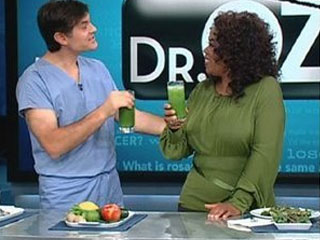Dr. Oz, Oprah and Resveratrol

Resveratrol is a naturally-occurring plant substance that has been scientifically shown to extend the lifespans of several non-human animals including fruit flies, nematode worms and fish. In mice, resveratrol has been shown by Professor David Sinclair and others to improve health (but not lifespan). In humans, there are at least 13 clinical research trials studying the effects of resveratrol on a wide variety of diseases including Alzheimer’s, cancer, diabetes and heart disease. Resveratrol has been praised by Dr. Mehmet Oz on the Oprah Winfrey show (the video is copyrighted by Ms. Winfrey’s company, Harpo Productions, and is no longer available on YouTube or elsewhere).
To give you some indication of how much interest resveratrol has generated, a Google search with this term yields 623,000 pages! As of today, there are over 2,800 articles about resveratrol in scientific and medical journals. Dozens, if not hundreds, of vitamin and supplement companies are advertising various tablets containing resveratrol, often mixed with other “nutriceutical” plant substances, vitamins and minerals. How can the average consumer make sense of the various claims and sources of what these dietary supplements are supposed to do?
We thought we’d try to provide some reliable information about resveratrol and so we are putting together a series of casebooks containing credible information from authoritative sources, such as the U.S. National Library of Medicine. The first casebook is provided below. In it, you can find some of the sources of resveratrol used by medical researchers in clinical trials. One of these studies got their resveratrol from a company that also provides it to Costco!
In a few days, we’ll be publishing another casebook, this one providing links to medical evidence about resveratrol’s effects. Please note that we are not endorsing the use of this substance for any particular health or medical condition. We have no financial interest in any of the companies selling resveratrol.
























0 comments